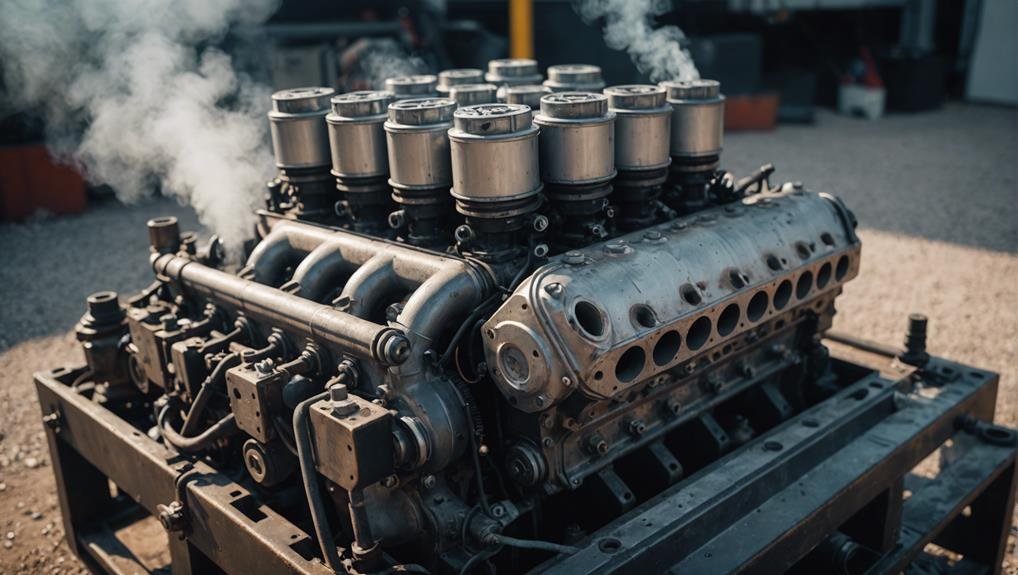Driving with low coolant levels can be catastrophic for your car, leading to engine damage, transmission failure, and reduced air conditioning performance. Low coolant can cause your engine to overheat, leading to warped cylinder heads, blown gaskets, and costly repairs. Regular coolant checks are vital to prevent overheating and damage. If you're driving with low coolant, you risk serious engine damage, transmission failure, and decreased performance. To avoid these issues, it's important to check your coolant level regularly and address any leaks or issues promptly. Learn more about the importance of coolant maintenance and how to prevent these issues.
Key Takeaways
- Low coolant levels can cause catastrophic engine damage, transmission failure, and reduced air conditioning cooling capacity.
- Driving with low coolant can lead to overheating, engine damage, and costly repairs.
- Neglecting regular coolant checks can result in severe engine damage, transmission failure, and AC system malfunction.
- Low coolant levels can lead to poor engine performance, increased fuel consumption, and serious engine damage.
- Regular coolant maintenance is crucial to prevent engine damage, transmission failure, and overheating, ensuring efficient engine performance.
What Happens If You Drive With Low Coolant
If you continue to drive with low coolant, you're risking catastrophic engine damage that can lead to costly repairs down the road. A low coolant issue can cause your engine to overheat, resulting in severe damage such as warped cylinder heads and blown head gaskets. This can happen suddenly, leaving you stranded and facing a hefty repair bill.
Moreover, low coolant levels can also affect your transmission, leading to transmission failure due to inadequate cooling. This can impact the general performance of your vehicle, making it difficult to shift gears or even causing your transmission to fail altogether.
In addition, your air conditioning system may also be affected, reducing its cooling capacity and leaving you with warmer air blowing from the vents. It's crucial to address low coolant symptoms promptly to prevent these issues from arising.
Causes of Low Coolant Levels
Typically, low coolant levels are triggered by a variety of culprits, including leaks in the cooling system, internal issues, and poor maintenance. If you're experiencing low coolant levels, it's important to identify the root cause to prevent further damage to your car.
One common culprit is a coolant leak, which can occur due to damaged or worn-out radiator hoses, connections, or the radiator itself. Internal leaks, like a faulty engine head gasket, can also contribute to low coolant levels. A faulty radiator cap seal can lead to coolant loss over time, while improper topping off or neglecting regular coolant maintenance can also result in low levels.
If you suspect a coolant leak, it's vital to visit car care experts for radiator services and repairs to address the issue promptly. By doing so, you'll prevent further damage and ensure your car's engine runs smoothly and efficiently.
Signs of Low Coolant in Car
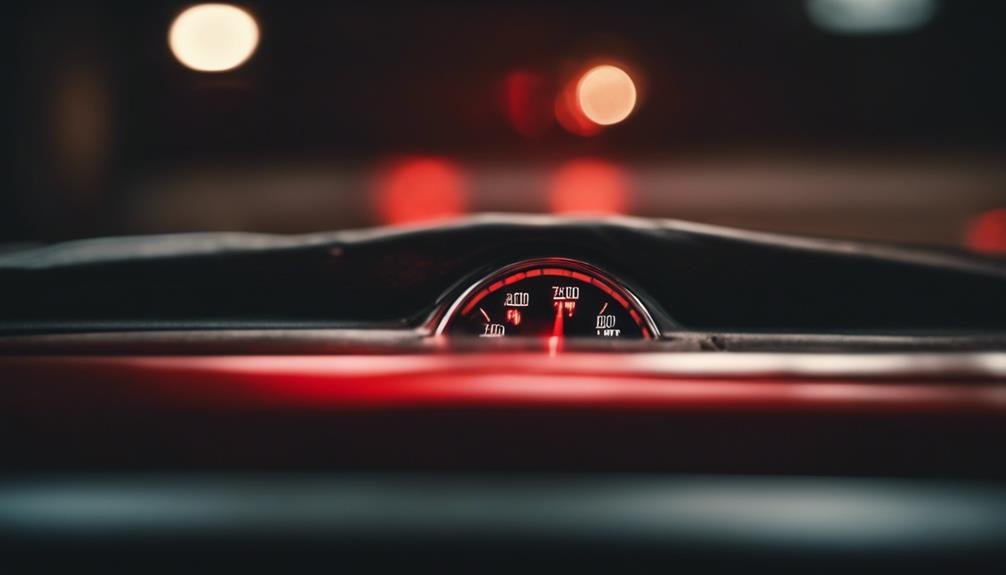
You'll often notice a sweet-smelling odor, a rising temperature gauge, or the need to repeatedly add coolant fluid when your car's coolant level drops. These signs indicate low coolant in your car, which can lead to engine overheating, poor fuel economy, and constant hot air blowing from the heater. If you're consistently adding coolant, it may signal a leak in the cooling system that needs prompt attention.
| Signs of Low Coolant | Description |
|---|---|
| Sweet-smelling odor | Coolant leak or overheating engine |
| Rising temperature gauge | Engine overheating due to low coolant |
| Need to add coolant frequently | Leaks or malfunctioning cooling system |
| Malfunctioning A/C system | Low coolant affects air conditioning performance |
| Illuminated coolant lights | Warning sign of low coolant level |
Addressing these signs promptly can prevent costly engine damage and ensure peak vehicle performance. Don't ignore these warning signs, as low coolant can have serious consequences for your car's engine.
Checking Coolant Level Is Crucial
How often do you check your car's coolant level, and are you aware of the devastating consequences of neglecting this significant maintenance task?
Checking the coolant level regularly is vital to prevent engine damage from overheating. Low coolant levels can lead to warped cylinder heads, cracked valves, and blown head gaskets.
Here are some key reasons why checking your coolant level is essential:
- Prevent engine damage from overheating by ensuring proper coolant levels.
- Low coolant levels can lead to transmission failure, which can be costly to repair.
- The AC system relies on proper coolant levels to function efficiently.
- Overheating can cause severe damage to your engine, leading to expensive repairs.
- Regular checks can prevent low coolant levels, ensuring your engine runs smoothly and efficiently.
Dangers of Overheating Engine
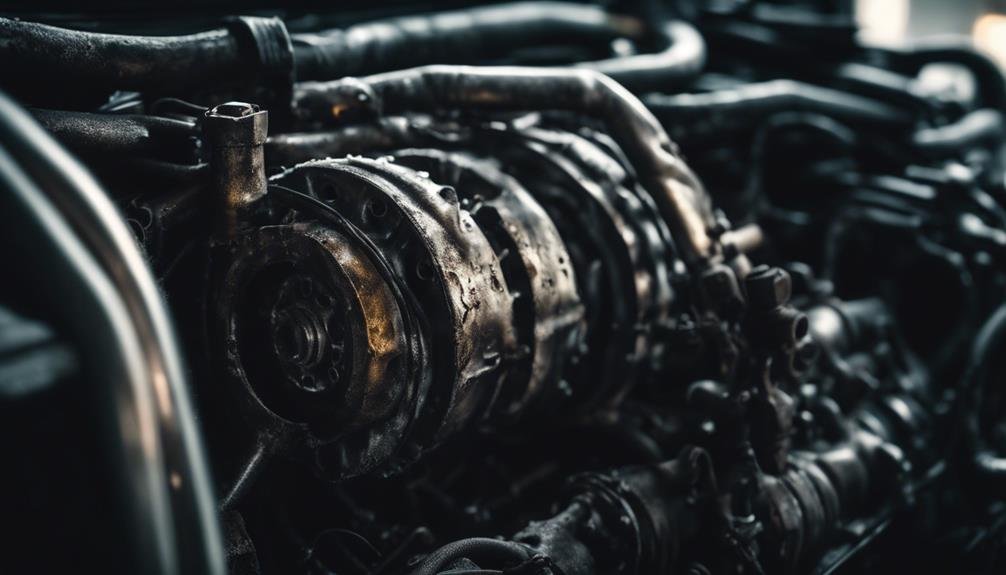
If you neglect to check your coolant level regularly, you're risking catastrophic engine damage from overheating, which can lead to costly repairs down the road.
An overheating engine due to low coolant can have devastating consequences, including warped cylinder heads and blown head gaskets.
Driving with low coolant can cause severe engine damage, such as cracked cylinder heads and warped valves, which can be extremely costly to repair.
Additionally, low coolant levels can also lead to transmission failure and prevent proper cooling of the AC system.
Monitoring coolant levels is vital to prevent costly engine repairs caused by overheating. By regularly checking and maintaining coolant levels, you can help prevent engine damage from overheating.
It's important to prioritize coolant maintenance to avoid these issues. By doing so, you'll be protecting your engine from severe damage and ensuring your vehicle runs smoothly and efficiently.
Can You Drive Without Coolant
Can driving without coolant really be that critical for your car? The answer is yes. Driving without coolant can lead to catastrophic engine damage due to overheating and lack of heat dissipation. Coolant is vital for preventing the engine from seizing up and causing costly repairs. It's not recommended to drive without coolant as it can result in irreversible damage to the engine.
Here are some important points to take into account:
- Low coolant levels can lead to poor engine performance, increased fuel consumption, and potential breakdowns.
- Without coolant, your engine's operating temperature will skyrocket, causing serious damage.
- Driving without coolant can lead to engine damage, which can be extremely costly to repair.
- Coolant is crucial to prevent engine issues, and driving without it can lead to serious problems.
- Always make sure your car has an adequate level of coolant to prevent serious engine issues.
How Low Coolant Affects Performance
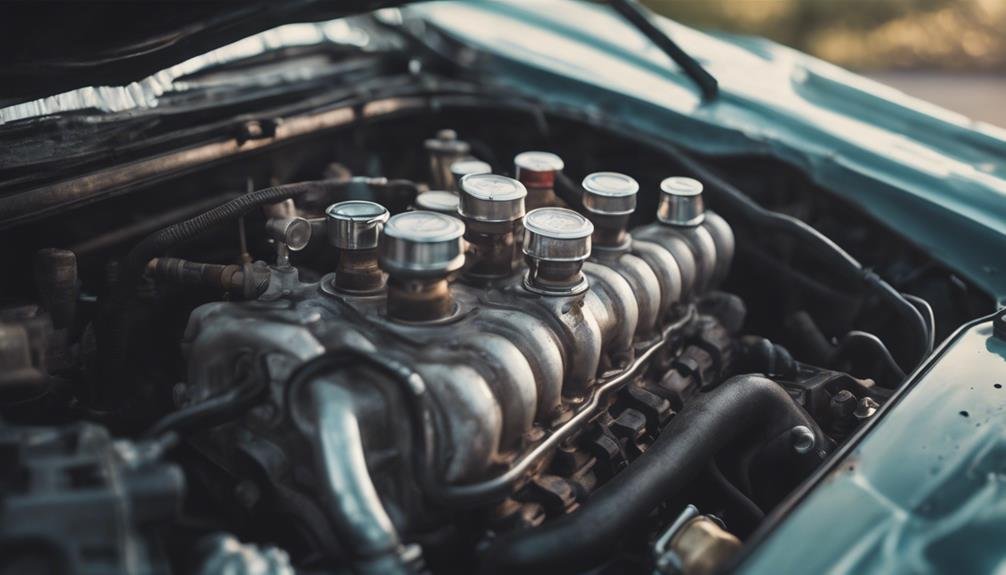
When you're running on low coolant, your engine's performance takes a hit, and you'll likely notice a decline in power and efficiency. As the coolant level drops, your engine becomes prone to overheating, which can lead to severe damage like warped cylinder heads and blown head gaskets if left unchecked. Additionally, insufficient coolant can cause transmission issues, potentially leading to complete transmission failure if not addressed promptly.
Even your AC system is affected, as low coolant levels impact its cooling capacity, resulting in warmer air blowing out. To avoid these issues, monitoring coolant levels is essential. Regularly checking coolant levels, fixing leaks, and using the recommended coolant type can help maintain top engine performance. By doing so, you'll prevent severe engine damage and ensure your car runs smoothly.
Identifying Coolant Leaks in Car
Since a single drop of coolant can indicate a larger problem, you should regularly inspect your car's cooling system to identify potential leaks before they cause engine damage. Identifying coolant leaks is essential to prevent overheating, engine damage, and transmission failure. Corrosion of freeze plugs, radiator cracks, worn hoses, and bad water pump seals can all lead to coolant leaks.
Here are some common signs to look out for:
- Green or yellow coolant drops under your car
- A sweet, pungent smell inside the car
- Overheating engine or increased engine temperature
- Low coolant level in the reservoir tank
- White smoke coming from the tailpipe
Regular checking and fixing of coolant leaks can help prevent costly repairs and ensure the efficient performance of your car's cooling system.
Don't wait until it's too late, as ignoring coolant leaks can lead to catastrophic engine damage and transmission failure. Stay on top of your car's maintenance and prioritize identifying and fixing coolant leaks to keep your engine running smoothly.
Refilling Coolant in Your Car
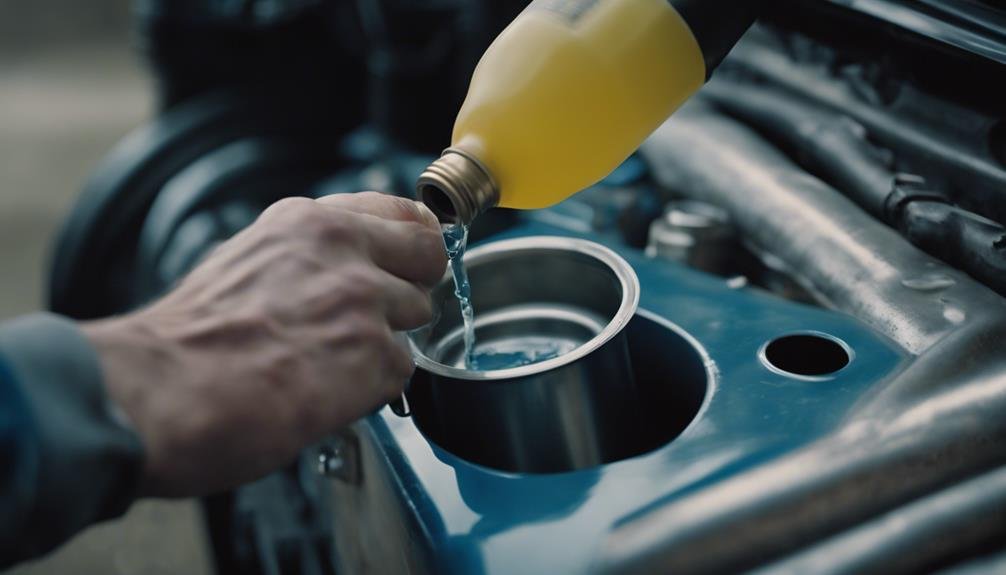
Refill your car's coolant regularly to maintain proper engine temperature and prevent overheating. If your coolant level is low, refilling coolant is vital to prevent engine damage.
Coolant absorbs heat from the engine and dissipates it through the radiator, enhancing engine performance. Proper coolant levels are necessary for preventing engine damage and ensuring smooth operation.
Regularly checking and refilling coolant can prevent costly repairs and extend the life of your vehicle. Using the recommended coolant type and mixing it with distilled water is important for efficient engine cooling.
By refilling coolant, you'll maintain proper engine temperature, prevent overheating, and ensure your engine runs smoothly. Don't wait until it's too late; regularly check your coolant level and refill as needed.
This simple maintenance task can save you from costly repairs and keep your car running smoothly for years to come.
Preventing Engine Damage Early
By catching low coolant levels early, you can prevent catastrophic engine damage and expensive repairs down the road. Low coolant can lead to engine overheating, causing severe damage like warped cylinder heads and blown head gaskets.
Insufficient coolant circulation can result in steam generation, zero cooling, and potential engine failure within minutes.
To avoid these costly issues, it's vital to:
- Monitor coolant levels regularly to prevent overheating and engine damage
- Address leaks promptly to avoid costly repairs
- Maintain proper coolant levels to prevent transmission issues
- Perform timely maintenance to guarantee smooth transmission operation
- Keep an eye out for signs of low coolant, such as an overheating engine or dashboard warning lights
Frequently Asked Questions
Is It Okay to Drive With Low Coolant?
You shouldn't drive with low coolant, as it can cause your engine to overheat, leading to poor performance, increased fuel consumption, and potential engine failure, which can be costly to repair.
How Long Can a Car Run on Low Coolant?
You can drive a short distance with low coolant, but it's important; prolonged driving can cause engine overheating and damage, so it's vital to address the issue promptly to avoid costly repairs or engine failure.
What Happens When You Dont Have Enough Coolant in Your Car?
When you don't have enough coolant in your car, you're risking engine overheating, transmission issues, and AC system failure, which can lead to costly repairs, including cracked cylinder heads and head gasket failure.
Can Low Coolant Cause Engine Problems?
You're right to wonder, can low coolant cause engine problems? Absolutely, it can lead to overheating, warped cylinder heads, blown head gaskets, and even transmission issues if left unchecked, so it's essential you monitor and maintain proper coolant levels.
Conclusion
Now that you've learned about the risks of low coolant levels, it's crucial to prioritize regular checks and maintenance to prevent engine damage.
Remember, even slight drops in coolant levels can lead to overheating, corrosion, and premature wear.
By staying on top of your coolant levels, you'll avoid costly repairs and guarantee your car runs smoothly and efficiently.
